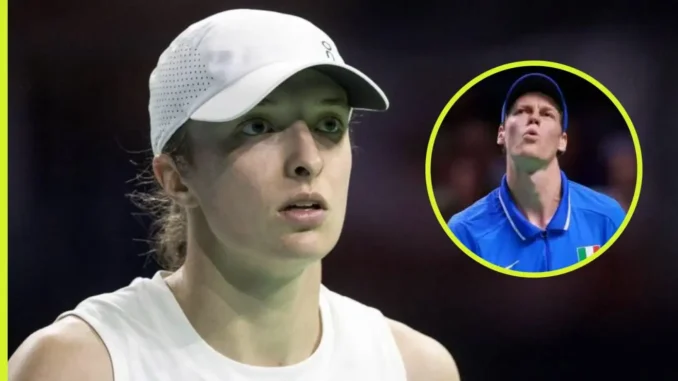
The tennis world is abuzz with controversy following the 2025 Wimbledon Championships, where Jannik Sinner and Iga Swiatek claimed the men’s and women’s singles titles, respectively. Their victories, while spectacular, have been overshadowed by doping allegations stemming from bans served earlier in their careers. Former Wimbledon champion Pat Cash has stepped into the fray, passionately defending the two stars against accusations of being “drug cheats,” urging critics to reconsider their stance and focus on the players’ undeniable talent and resilience.
Sinner, the world No. 1, secured his first Wimbledon title with a gripping four-set victory over Carlos Alcaraz, avenging a French Open final loss just weeks prior. The 23-year-old Italian’s triumph came less than two months after completing a three-month suspension for testing positive for clostebol, a banned anabolic steroid, in March 2024. Swiatek, meanwhile, dominated Amanda Anisimova in a historic 6-0, 6-0 rout, marking the first “double-bagel” Wimbledon final in over a century. Her victory followed a one-month ban in late 2024 for testing positive for trimetazidine (TMZ), a heart medication that can enhance endurance. Both players successfully argued that their positive tests resulted from contamination—Sinner via a physiotherapist’s spray and Swiatek through a tainted melatonin supplement—yet their triumphs have sparked heated debate.
Pat Cash, the 1987 Wimbledon champion, took to social media to address the criticism head-on. “Well done Jannik,” he posted, expressing support for Sinner and his team, including coach Darren Cahill, a close friend. “I’ve heard a lot of stuff pop up on social media about the ‘drug cheats’ winning Wimbledon, but it’s a little sad that this is still going on,” Cash lamented. He emphasized that both Sinner and Swiatek’s cases involved unintentional contamination, not performance-enhancing intent. “Swiatek and Sinner were contaminated. It was not performance-enhancing. If you think WADA and the International Tennis Integrity Unit don’t do their homework and check this out, then you are absolutely insane,” he declared, urging detractors to “do a bit of homework” before casting aspersions.
The controversy has divided the tennis community. Critics like Nick Kyrgios have been vocal, with the Australian star labeling the situation “disgusting for our sport” and arguing that Sinner’s three-month ban was too lenient, suggesting a two-year suspension would have been more appropriate. Kyrgios posted a cryptic asterisk on social media after Sinner’s win, a gesture widely interpreted as a jab at the doping saga. Similarly, Novak Djokovic expressed concerns about the sport’s image, stating, “It’s not a good image for our sport,” and noting that many players feel the handling of Sinner’s case suggested favoritism toward top stars. Swiatek, too, faced scrutiny, with some questioning the brevity of her ban, which allowed her to miss only minor tournaments.
Both players have addressed the emotional toll of the allegations. Sinner, reflecting on his Wimbledon triumph, shared that he and Swiatek discussed their shared ordeal. “Me and Iga, we actually talked yesterday about this, and we’ve been celebrating in a way even more, because it was a very difficult time for her and also for me,” he said, highlighting the stress of the past months. Swiatek echoed this sentiment, noting the media’s harsh treatment: “The past months, how the media sometimes described me, how they treated me and my team, it wasn’t really pleasant.” She expressed hope that critics would “leave me alone and let me do my job.”
The doping cases have raised broader questions about tennis’ anti-doping protocols. Sinner’s positive tests stemmed from a physiotherapist’s use of a clostebol-containing spray, which was transferred during a massage. The World Anti-Doping Agency (WADA) accepted that the substance provided no performance benefit and was due to negligence by his team, leading to a negotiated three-month ban rather than a potential two-year suspension. Swiatek’s case involved a contaminated melatonin supplement, confirmed by independent labs, resulting in a minimal sanction due to her “no significant fault” status. WADA’s general counsel, Ross Wenzel, defended the resolutions, stating, “This was a case that was a million miles away from doping.”
Despite the controversies, Sinner and Swiatek’s performances at Wimbledon underscored their brilliance. Sinner’s mental fortitude shone through as he outlasted Alcaraz, while Swiatek’s commanding final showcased her dominance. Cash’s defense resonates with those who see the players as victims of circumstance rather than deliberate cheaters. “They are the best players in the world for a reason,” Cash asserted, praising their determination and mental capacity. As the tennis world looks ahead to the US Open, the focus remains on whether Sinner and Swiatek can continue to rise above the noise and cement their legacies as champions.
Leave a Reply